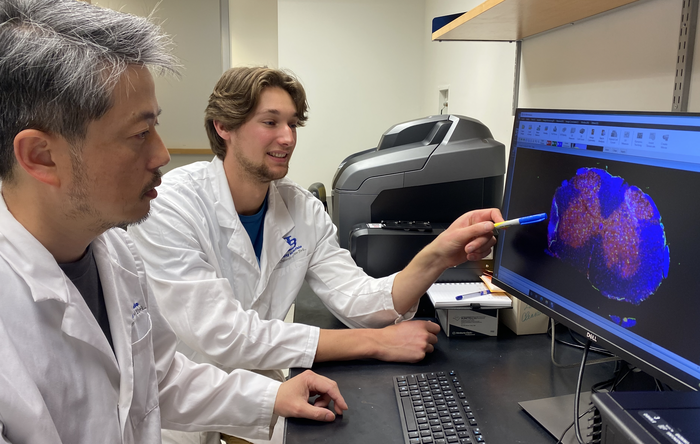The gene defect underlying Krabbe disease causes degeneration of neurons directly, independent of its effects on other cell types, according to a new study publishing July 5th in the open-access journal PLOS Biology by Daesung Shin of the University at Buffalo, U.S. and colleagues. The discovery represents a new mechanism of action for the mutant gene, presenting a more accurate picture of the disease process that may help in the development of therapies.

Credit: Daesung Shin (CC-BY 4.0, https://creativecommons.org/licenses/by/4.0/)
The gene defect underlying Krabbe disease causes degeneration of neurons directly, independent of its effects on other cell types, according to a new study publishing July 5th in the open-access journal PLOS Biology by Daesung Shin of the University at Buffalo, U.S. and colleagues. The discovery represents a new mechanism of action for the mutant gene, presenting a more accurate picture of the disease process that may help in the development of therapies.
Krabbe disease is a rare autosomal recessive neurodegenerative disorder caused by mutations in the galactosylceramidase (GALC) gene. GALC is an enzyme that is active in the lysosomes, and its absence leads to the buildup of the lipid psychosine. Accumulation of psychosine in the brain and elsewhere triggers destabilization of cell membranes, degeneration, and cell death. Loss of myelin insulation around the nerves is a major pathological feature of Krabbe disease, and oligodendrocytes, which make myelin, have naturally been thought of as the drivers of the disease process, with degeneration of neurons a secondary consequence of this loss of myelin.
Other, more recent evidence has suggested that neurons may be affected independently, but that hypothesis has been difficult to test, as GALC is expressed ubiquitously in the brain, and its disease-related loss occurs in all cell types. To overcome that barrier, the authors created a mouse model in which GALC expression was knocked out only in neurons, retaining activity of the normal gene elsewhere.
They found that psychosine accumulated in neurons, leading to abnormally shaped lysosomes, swollen axons, and increased neuronal death, along with neuroinflammation and deficits in motor ability and coordination in mice. While there was no loss of oligodendrocytes, lack of neuronal GALC expression did lead to a reduction in myelination, presumably through toxic effects on myelin sheaths from the accumulated psychosine.
“Our results indicate for the first time that neuronal expression of galactosylceramidase is essential to maintain and protect neuronal function, independent of its effects on myelin-producing oligodendrocytes,” Shin said. “These results suggest that lack of the enzyme in neurons may contribute directly to the pathogenesis in Krabbe disease, and that therapies for the disease may need to address the absence of neuronal expression of galactosylceramidase in order to be fully effective.”
Shin adds, “Our study is the first attempt in a preclinical live animal model to directly investigate the neuronal role of the Krabbe disease gene galactosylceramidase. In generating a neuron-specific mutant of Krabbe disease, we found an intrinsic neuronal role for this enzyme is particularly novel and exciting, suggesting that, independently of myelin and other brain cell types, neuronal galactosylceramidase has a primary role in neuronal homeostasis and thus galactosylceramidase-depleted neurons could primarily contribute to Krabbe disease. Since the protective role of neuronal galactosylceramidase is suggestive of a novel function unrelated to its canonical role in myelination, augmenting galactosylceramidase to neurons would likely improve the efficacy of therapeutic interventions for Krabbe disease.”
#####
In your coverage, please use this URL to provide access to the freely available paper in PLOS Biology: http://journals.plos.org/plosbiology/article?id=10.1371/journal.pbio.3001661
Citation: Kreher C, Favret J, Weinstock NI, Maulik M, Hong X, Gelb MH, et al. (2022) Neuron-specific ablation of the Krabbe disease gene galactosylceramidase in mice results in neurodegeneration. PLoS Biol 20(6): e3001661. https://doi.org/10.1371/journal.pbio.3001661
Author Countries: United States
Funding: This work was supported by grants from the National Institutes of Health [R01-NS112327 and R56-NS106023 to D. S.], [R01-NS111715 to L. W. and M. L. F.], [F30-NS090835 to N. W.], and European Leukodystrophy Association [ELA-201802314 to L. W.]. The funders had no role in study design, data collection and analysis, decision to publish, or preparation of the manuscript.
Journal
PLoS Biology
DOI
10.1371/journal.pbio.3001661
Method of Research
Experimental study
Subject of Research
Animals
COI Statement
Competing interests: The authors have declared that no competing interests exist.




